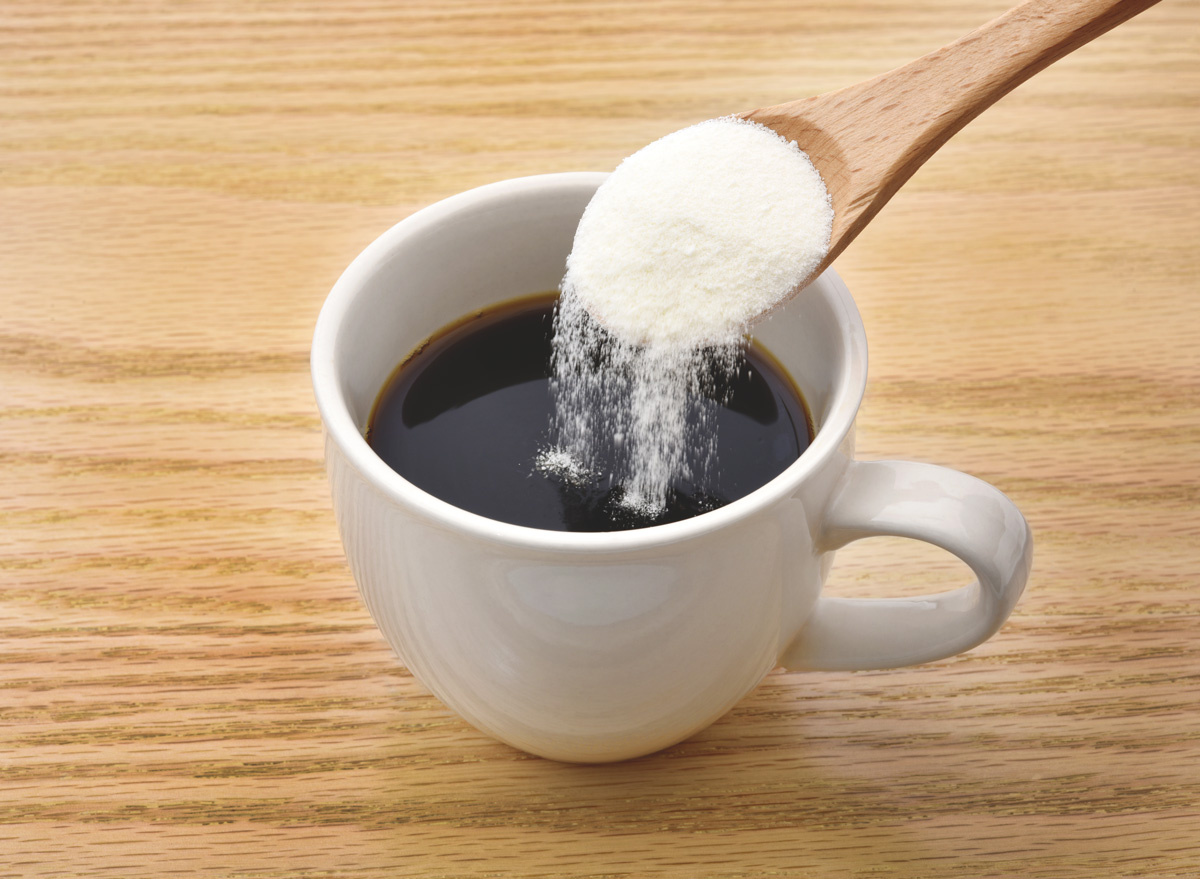The One Ingredient Everyone's Adding to Their Coffee

The days of cream and sugar are over. There's a new ingredient in town that everyone is putting in their coffee—and it's not just for flavor: adaptogens.
Adapta-whats?
"Adaptogens are nontoxic herbal pharmaceuticals which claim to help us better cope with (or increase our resistance to) mental or physical stress, improving physical and mental performance, and possibly supporting the immune system," says Silvia Carli, MS, RD, registered dietitian for 1AND1 LIFE. (Related: 11 Healthy Foods That Make You Smarter, According to Doctors.)
Many of the new canned and bottled coffee drinks use adaptogens to help deliver all the focus of caffeinated coffee but with less of a crash or jitters while providing stress-relieving benefits.
While adaptogens have been used for thousands of years in traditional herbal medicine, they're only recently becoming more commonplace as more research is being done to confirm their benefits.
"Functional mushrooms are finally having their moment in the public spotlight, in large part due to the growing amount of research into their health benefits as well as their applications in food," says Kerry Hughes, MS, CNC, a certified clinical nutritionist, ethnobotanist and herbalist who is on the Scientific Advisory Board for Good Pharma.
What is the point of adding adaptogens to coffee?
If you've ever felt too jittery after drinking plain coffee, you might be interested in drinking adaptogen-enriched coffee, which is often much lower in caffeine than a traditional cup of joe while also having the benefits of functional mushrooms.
As adaptogens have been linked to lower stress levels, adding them to coffee may help to lower our level of stress and burnout in an easy way—by adding it to something we drink every day anyway.
"The search is on for more natural and accessible ways to manage stress that may also have additional health benefits such as increased cognitive function as well as boost immunity," says Aimee Plauche, RD, an advising registered dietitian for ICONIC. And adaptogens are one of the ways to do this.
Do adaptogens actually do anything?
These mushrooms and roots have been used in Chinese and Ayurvedic medicine for thousands of years, but we're just starting to do more research into adaptogens to prove their benefits.
"While more research is needed, studies on the utility of certain adaptogens seem promising," says Kylie Ivanir, MS, RD, a registered dietitian at Within Nutrition.
"Studies conducted in animals and in human cell samples have shown that adaptogens may indeed demonstrate neuroprotective activity, have anti-fatigue and antidepressant properties, and can serve as a stimulant for the central nervous system. Studies have shown that particular adaptogens, such as Rhodiola extract, can improve cognitive function and combat fatigue," says Ivanir.
She adds that larger research studies completed on humans are needed to determine the efficacy of each particular adaptogen.
Types of adaptogens
There are a few common adaptogens that are used more frequently in coffee:
- Reishi: This mushroom "has been used for health and longevity purposes in Western medicine for centuries and there's human research showing its positive impact on the immune system. Other research suggests it has anticancer and mood-boosting effects," says Uma Naidoo, MD, a Harvard-trained nutritional psychiatrist, professional chef, nutrition specialist, and the author of This is Your Brain on Food.
- Ashwagandha: "It's an ancient herb used for centuries in Ayurvedic medicine. It has also been studied in humans where it was found to improve an individual's resistance towards stress and thereby improve self-assessed quality of life," explains Dr. Naidoo.
- Turmeric: "Curcumin, turmeric's active ingredient, improves mood, decreases stress, and changes the corresponding brain chemistry, protecting the hippocampus because stress can deactivate the hippocampus," says Dr. Naidoo.
- Cordyceps: "Cordyceps has been used in traditional Chinese medicine for their health potentials such as anti-cancer and immune-boosting effects. They have two bioactive compounds that can increase anti-inflammatory and antioxidant levels. This leads to improved cognitive function, gastrointestinal health and better sleep," says Abbie Gellman, RD, a registered dietitian and chef at the Institute of Culinary Education. "For cordyceps, a study of human subjects found that cortisol levels of both men and women were lower over time compared to placebo in subjects recovering from motion fatigue (a form of stress)," says Dr. Naidoo.
- Lion's Mane: "Lion's Mane are mushrooms that can enhance cognitive function and improve memory, and it contains many bioactive compounds like β-glucan polysaccharides that are neuroprotective and neurogenerative. Studies have also shown that this mushroom can reduce depression and anxiety," says Gellman.
Do you need to drink adaptogen coffee?
Adaptogen coffee has some great added benefits, but experts say you shouldn't be drinking it as a solution to your underlying health problems.
"It's not that adaptogens would not improve your quality of life if you are extremely stressed, but is that the factor that is going to make the biggest difference?" says Carli.
She recommends taking a closer look at your daily habits: "I want to invite the readers to reflect on a couple of points: are there other adjustments that we can make in our daily routine to ease the stress in our lives? For example: are we practicing self-care, eating an overall healthy, varied, and balanced diet without overly processed foods? Are we sleeping well? Do you journal? Do you exercise? Do you have an outlet to talk about your stressors?" says Carli.
If you're dealing with a lot of stress, it might be best to combine your adaptogen coffee with other stress-reducing habits.
Keep in mind…
Adaptogens aren't for everyone. And it's not just about personal preference—taking adaptogens isn't safe for certain people.
"It is important to note that certain adaptogens may not be safe for everyone including pregnant women, so it is always best to consult with your healthcare provider," says Ivanir.
As with any supplement, Carli notes that you should make sure the adaptogens you're consuming are safe—especially considering that these are a fairly new product.
"When new supplements get on the market quickly due to new trends (sometimes poorly supported by research), the process of testing for quality and purity is not always ideal and thorough, which means that we are not certain of the actual contents of that supplement and it could turn out being harmful to health," says Carli. (Related: 6 Popular Supplements That Don't Actually Work, According to Experts.)
That's why Ivanir tells that it's important to choose reputable brands that have been third-party tested to ensure there are no contaminants or heavy metals.
And although the benefits of adaptogens sound enticing, it's always good to keep in mind that it's best to not rely on taking these ingredients alone for their benefits without following a well-balanced diet.
"Adaptogens should not take the place of a balanced diet, physical activity, and any necessary medications, they may be used as a supplement to support overall health," adds Ivanir.
So in addition to drinking adaptogen coffee, you can also try these 22 Proven Tricks That Melt Stress.
Adaptogen Coffee Brands to Try
- Four Sigmatic Mushroom Coffee Latte with Lion's Mane: A low-caffeinated (50 milligrams) ground coffee with lion's Mane and Chaga is blended with coconut milk powder so these little latte packets are ready to drink with just hot water.
- Taika Macadamia Coffee Latte: A plant-based, creamy, slightly sweetened canned coffee enhanced with L-theanine, ashwagandha, cordyceps, lion's mane, and reishi.
- Clevr Blends Coffee SuperLatte: Organic Colombian arabica coffee (50mg caffeine) blended with oat milk and coconut cream, powered by ashwagandha, lion's mane, and reishi. Oh, and they also throw in some probiotics.
- Mud\Wtr: For a coffee alternative, turn to this chai latte mix that has just 1/7th the caffeine of coffee (thanks to a bit of organic black tea powder), but delivers steady energy with the help of chaga, cordyceps, reishi, and lion's mane.
- Good Pharma Brain Gain Coffee & Mushroom Infusion: Arabica coffee and a scientifically potent amount of lion's mane mushroom extract, which is known to support brainpower, that comes in a pour-over infuser.
For more healthy eating news, make sure to sign up for our newsletter!








